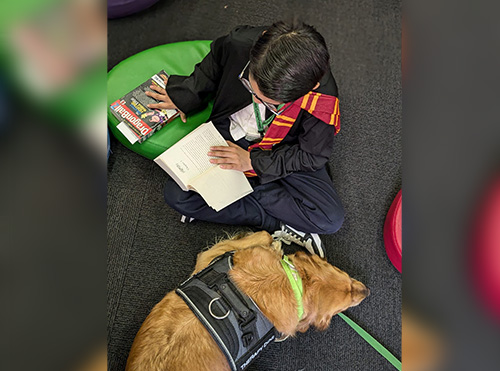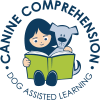
Our Blog
Finding the Perfect Animal-Assisted Match for Your Young Person

Navigating the world of animal-assisted services can be both exciting and overwhelming for guardians looking to support their young person's development. With a myriad of terms and roles, it's crucial to focus on what truly matters: the unique service each animal provides.
Beyond Definitions
While definitions like Animal-Assisted Therapy (AAT) and Animal-Assisted Education (AAE) offer a framework, they can vary across organisations and countries. Rather than getting caught up in terminology, consider asking, "What specific service or activity does this animal perform for my young person?"
Here's a quick guide to some common roles:
Animal Assisted Intervention (AAI): Encompasses a range of goal-oriented interactions involving animals for therapeutic benefits.
Animal Assisted Therapy (AAT): Professionals-led structured therapy sessions to enhance physical and emotional well-being.
Animal Assisted Education (AAE): Incorporates animals into educational settings to support academic and cognitive goals.
Animal Assisted Activity (AAA): Informal interactions for motivation, education, or recreation.
Assistance Animal: Trained to perform specific tasks for individuals with disabilities, providing essential support and accessibility.
Canine Comprehension's Therapy Dogs: Tailored Support for Young People
At Canine Comprehension, we refer to our dogs as 'therapy dogs' for SEO purposes, helping potential clients find us online. While we use this term in a general sense, we encourage everyone to explore the nuances of these roles further. A great resource is the paper "Defining Terms Used for Animals Working in Support Roles for People with Support Needs" by Howell et al., which offers a comprehensive understanding of these terms.
Our therapy dogs are more than just adorable companions; they're integral to creating a nurturing and supportive environment for learning and growth. Here's how they cater to the unique needs of your young person:
Educational Companions: These dogs act as furry teaching assistants, helping young people improve their reading skills and boost their confidence. Imagine your child reading to a patient, attentive dog—it's a transformative experience!
Emotional Support Specialists: Our dogs' calming presence helps manage anxiety and stress, creating a safe space for emotional expression.
Engagement Facilitators: By encouraging participation, these dogs make learning more enjoyable and accessible, breaking down barriers in the classroom.
Social Skill Builders: Through guided interactions, Canine Comprehension dogs help young people develop empathy, communication, and cooperation skills.
Mindfulness Mentors: Their gentle demeanor aids in mindfulness practices, promoting relaxation and focus.
Confidence Boosters: Interacting with therapy dogs boosts self-esteem, thanks to the unconditional love and acceptance they offer.
Bridge Builders: They foster positive relationships between young people and educators, creating a warm, welcoming atmosphere.
Questions to Ask When Choosing a Working Dog
When seeking a working dog to support your young person, consider asking these important questions:
- What specific roles and tasks is the dog trained to perform?
- How does the dog interact with the client, particularly those with specific needs?
- What is the dog's temperament and energy level?
- What training and certifications does the dog have?
- What are the expectations for the young person's involvement in the session?
- How does the organisation ensure the ethical treatment and welfare of the dog?
- What are the costs involved, and are there any financial assistance programs?
By focusing on these dogs' specific roles and asking the right questions, you can find the perfect match for your young person's needs. Canine Comprehension therapy dogs are not just pets; they're partners in learning and development, making a tangible difference in their lives.
For more insights into how these incredible dogs can support your young person, book a chat today.
